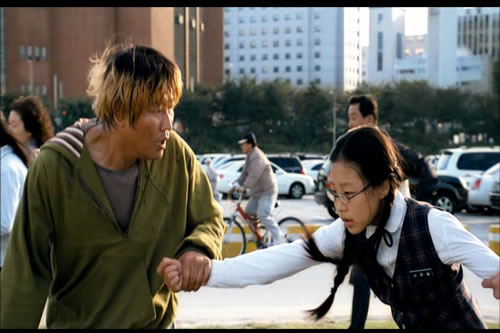The Host completely ignores this trope. We get a good long shot as the monster runs past us, in broad daylight, fourteen minutes into the film. Although this is a monster movie, writer/director Bong Joon-Ho knows that it’s not the appearance of the creature that is threatening, but how it acts. With photorealistic CG effects, render farms, and experts at translating concept to screen, it is much easier to create a credible monster than in the past.
The film's narrative is much more akin (and this is acknowledged by Bong Joon-Ho in his commentary) to a crime thriller than the standard monster film. A child is in peril, and her family must fight the government as well as the monster’s unpredictability and inhuman strength to get her back.
Early in the film, the monster smashes through a crowd, shredding people and creating panic. Park Gang-du grabs his daughter Hyun-Seo and runs, dragging her behind him. He falls, grabs her hand again, and takes off running again. After eight more seconds of panicked flight, he looks back... and he’s grabbed the wrong hand. The girl behind him isn’t Hyun-Seo.

We identify the most with human moments, with emotions we understand. Gang-du’s blank expression conveys his stunned incomprehension, and for a few seconds, he’s too shocked to even be horrified. It’s a gut-wrenching moment of loss, and an presage of terrible things to come.
No comments:
Post a Comment